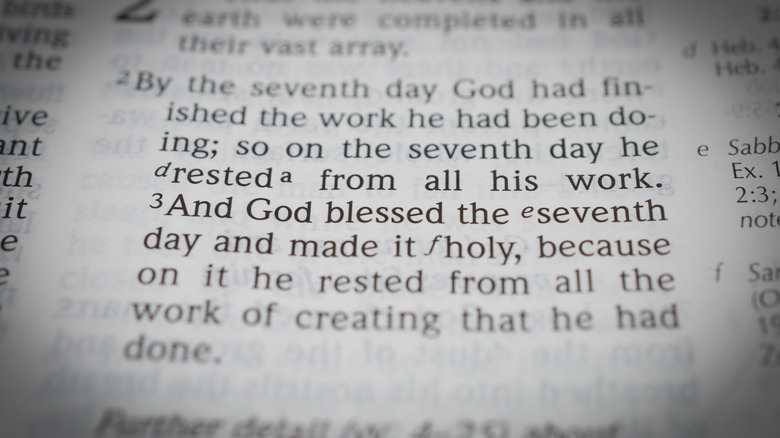The Meaning Of The Number 7 In The Bible Explained
If we asked you to name the most perfect number, there's a good chance that you'd say "seven." In many cultures, seven is treated as a number with special significance — a digit far more mysterious and sublime than its neighbors "six" and "eight." In the Western world, one major reason for this love of seven is the symbolic role that seven plays in the Bible — both the Old and New Testaments.
As Bible Study reports, seven is arguably the most significant number in the Bible; it appears a total of 735 times, or 860 times if you count variations like "seventh" and "sevenfold." The first major occurrence is in Genesis 2:2; God created the entire universe in six days, "so on the seventh day he rested from all his work." Later, in Genesis 7:2, God tells Noah to bring seven pairs of each animal onto the Ark. (That's right, seven pairs — not just one, as commonly depicted.) The Passover ceremony is also seven days long, as laid out in Exodus 13.
In the Gospel of John, Jesus Christ is said to have performed seven miraculous signs, per The Compass News. Likewise, across all four Gospels, there are seven final sayings of Jesus as he died on the cross. Additionally, Bible Study points out that the Bible was originally thought to have seven major divisions: "1) the Law; 2) the Prophets; 3) the Writings, or Psalms; 4) the Gospels and Acts; 5) the General Epistles; 6) the Epistles of Paul, and 7) the book of Revelation."
In the Bible, 7 represents creation — but it may have been borrowed from the Babylonians
We've offered just a few examples, but trust us when we say that seven comes up a lot more in the Bible. But, still, knowing this leads to a deeper question: why did the authors of the Bible consider seven so significant?
The Jewish Encyclopedia refers to the number seven as "the general symbol for all association with God" and "the favorite religious number of Judaism." Since God created the universe in six days and rested on the seventh, seven also represents both completion and perfection. But, as it turns out, there may be a deeper reason for why God's creation of the universe took seven days. Per Discover Magazine, the seven-day week actually started with the ancient Babylonians, who chose seven days based on the seven celestial bodies which they were able to observe (the Sun, the Moon, Mercury, Venus, Mars, Jupiter, and Saturn). The ancient Jews borrowed the seven-day week from the Babylonians — which may explain why Genesis reports that God's act of creation took seven days.
But, while seven represents creation, it can also represent destruction. In the New Testament, seven is most prevalent in the Book of Revelation, which describes the apocalypse; Bible Study states that seven appears 54 times in that Book alone. Revelation describes seven churches, seven angels to the seven churches, seven seals, seven plagues, and seven trumpet calls — with the resurrection of the dead occurring upon the seventh blast of the trumpet, per Bible Study.

